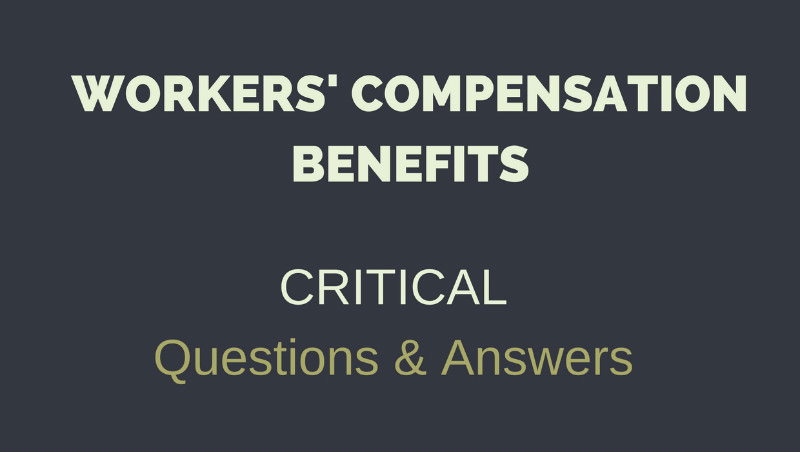If you were injured at work, you may qualify for workers’ compensation benefits. These benefits will cover medical treatment, paid time off during recovery, compensation for any permanent disability as a result of the injury and even job training if you aren’t able to continue work in your current position. In order to receive these benefits, you must file a workers’ compensation claim and follow your state’s procedures. There are many grey areas when it comes to getting the benefits you are entitled to. These five questions will guide you in the right direction.
1. Am I covered by workers’ compensation?
When determining eligibility for workers’ comp, there are two main things to consider before anything else. First of all, are you an employee? Many people today who seem like employees are actually self-employed as independent contractors. If you work for Uber, GrubHub, Instacart, or any other on demand platforms, you’re considered self-employed and won’t receive workers’ compensation benefits if you’re in a work-related accident. Independent contractors aren’t uncommon in the construction world either, likely to avoid dealing with potential injury claims. The second thing to consider: Was your injury caused by your employment? There’s a huge range of work-related injuries and accidents that can occur. Slips and falls, muscles strains, burns, cuts, injuries from car accidents and falling objects are just a few common ones. If you answered yes to both of these, then you are entitled to workers’ compensation benefits.
2. When do I file a workers’ compensation claim?
If you do not need urgent medical care, report your injury to your employer immediately. If you fail to report an accident or wait too long, you could be denied medical treatment and out of work benefits by your employer. The limit on the length of time you can wait to inform your employer of a work-related injury varies from state to state. While a month is typical of most states, it can range from a few days to even two years. However, the sooner you report it, the better. It’s important to report any accident that occurs, even if you do not think you are seriously injured. This is a good idea because if a complication from the accident comes up a few weeks later, your employer can deny it happened at work. When you inform your employer about the accident, they should have claim forms for you to fill out. You can always call your local workers’ compensation office if you have any issues.
3. As an employee injured on the job, am I guaranteed workers’ compensation benefits regardless of how I was injured?
If an employer can prove that the employee’s personal negligence is the cause of his/her injury rather than the job requirements or work conditions, then the employer won’t have to pay workers’ comp. So if you injured yourself on purpose to get out of work, you better hope you made it look like an accident or you’re going to find yourself with a huge medical bill, no job, and no workers’ compensation benefits. Intoxication or drug abuse would also prevent a claim from being approved. On the flipside, employers may use this as a way to get out of paying even if they should, by creating an at-fault situation that doesn’t exist. Hiring a workers’ compensation lawyer will help ensure you get benefits you’re entitled to.
4. Can an employee file a workers’ comp claim, even if he or she was not actually at the workplace when injured?
This is dependent your specific situation. Were you travelling for work? Were you running a work-related errand? If you weren’t at your work site during the injury, the lines definitely get blurry. It’s harder to prove that your injury was a result of your employment. Consult with an attorney on your particular case to find out if it’s worth it for you to file a claim.
5. What do you do if your claim is disputed by your employer or its insurance carrier?
When an accident occurs, make sure you have the right documentation for everything. That way if your claim is disputed, you will have physical evidence to validity your claim. Save all medical records related to your injury and treatment. If they’re disputing cost, or unnecessary treatment, you will have exact records to prove otherwise. Consult a workers’ compensation lawyer if you think you’re not getting the benefits you deserve. Your employer or their insurance carrier could claim that they’re not at fault for the injury and therefore don’t have to cover it. Your employer might claim that you weren’t on the job site or that you were on a personal errand. Many employers / insurance carriers will try to pay as little as possible, banking on their employee not wanting to pay for or deal with lawyer.
Talk to a Workers’ Compensation Lawyer
Reach out to a seasoned Worker’s Compensation Attorney to discuss how to file a workers’ compensation claim. Most attorneys will give you a free consultation which will help you decide whether or not hiring a lawyer is necessary for your case.


